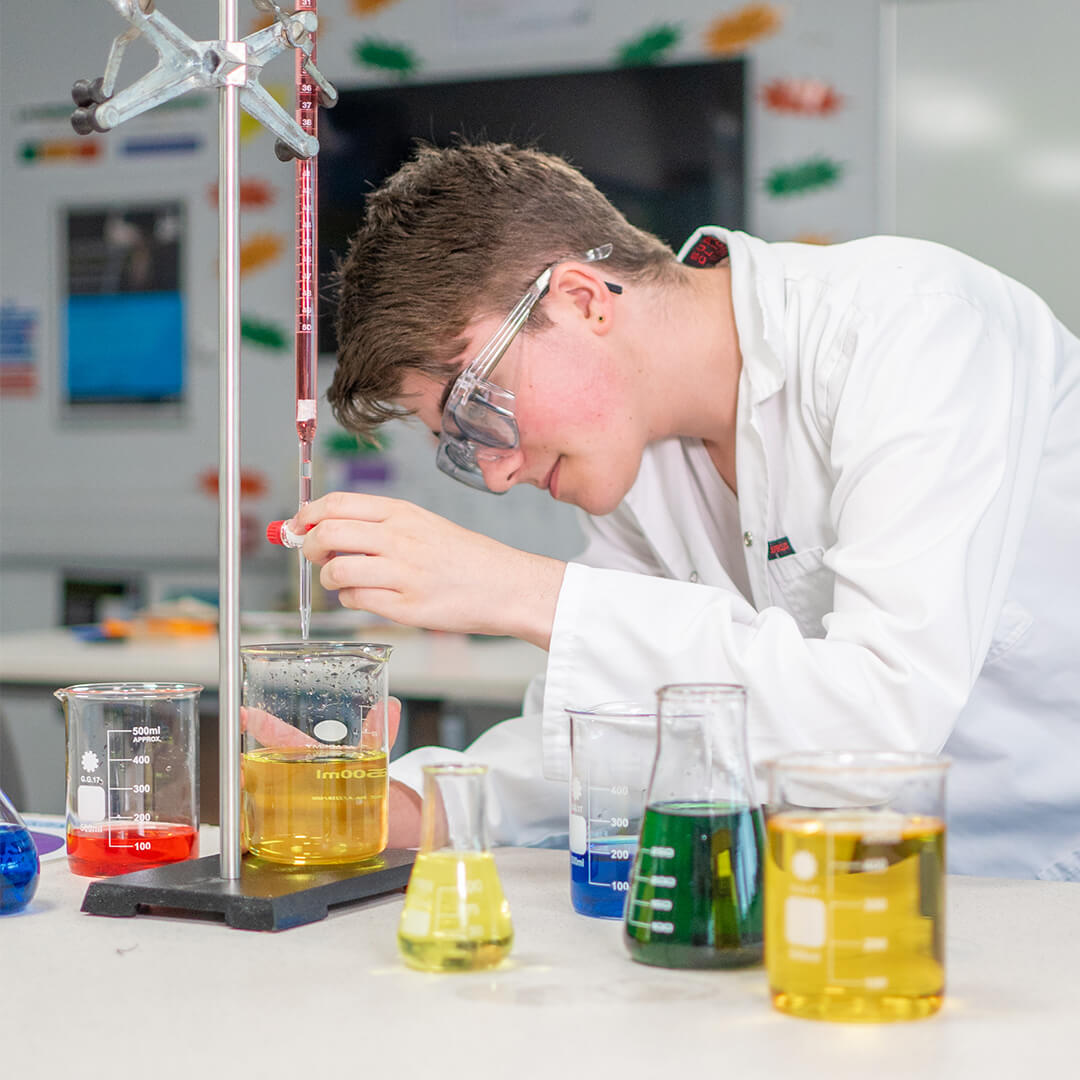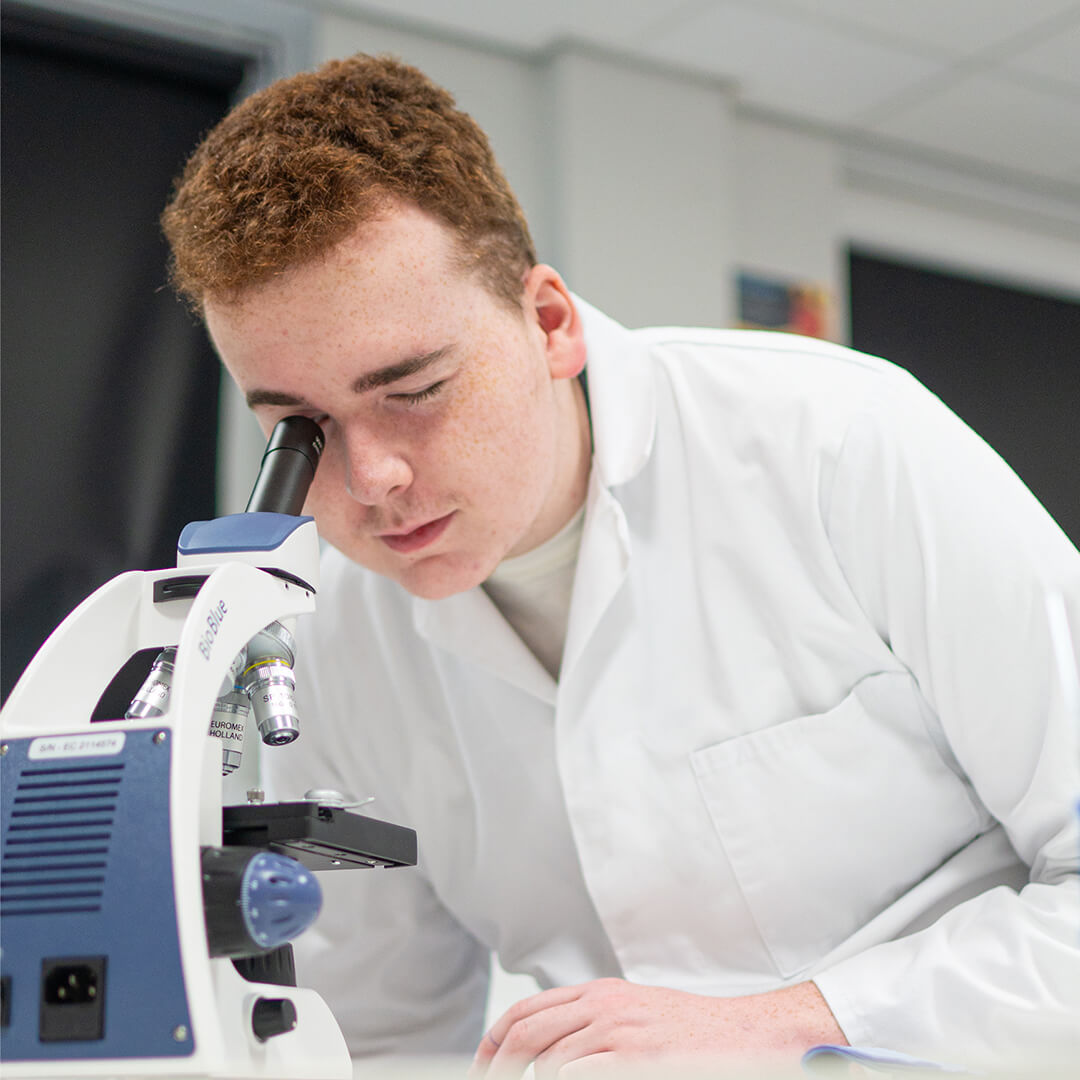Course overview
A Level Chemistry opens the door to a range of careers in areas like pharmacy, medicine, nursing, radiography, forensics, and even law and accountancy The course will give you the scientific discipline needed to study higher education science at university or get an entry level position in the industry.
This course is ideal if you are interested and intrigued by Chemistry and are keen to develop an understanding of the world of atoms, molecules and chemical reactions.
This course covers a range of topics including: Organic Chemistry, Physical Chemistry, Inorganic Chemistry, Analytical Chemistry and Practical Chemistry and is 2 years full-time, when taken alongside two or three other A Levels.
Chemistry is fundamentally an experimental subject. The specifications provide numerous opportunities to use practical experiences to link theory to reality, and equip you with the essential practical skills you need.
You will take A Level exams at the end of year 13.
Topics
Whilst studying the A Level Chemistry course you will cover a range of different topics including:
Physical chemistry – atomic structure, electron configuration, moles and Avogadro’s, equations and formulae, the nature and types of chemical bonding, enthalpy change, calorimetry, kinetics, equilibrium and at A Level only thermodynamics, rate equations, equilibrium expressions, acids and bases, acid dissociation constants, pH curves, buffers and indicators, electrode potential and electrochemical cells.
Inorganic Chemistry – Periodic trends and properties of period 3 elements, group 2 trends, group 7 trends and at A Level only oxides of period 3, transition metals, ligand substitution, complexes and catalysts.
Organic Chemistry – nomenclature, reaction mechanisms, isomerism, alkanes, haloalkanes, alkenes, alcohols and at A Level only optical isomerism, carboxylic acids, aromatic chemistry, amines and polymers.
Analytical Chemistry – mass spectroscopy, infra-red spectroscopy and at A Level only proton NMR, Chromatography and organic synthesis
On this course you will be taught through a variety of different methods, theory lessons, independent research and practical experiments. You will also be expected to support self-study using the internet, text books and information sheets.
Overall, at least 30% of the marks in assessments during the course will require the use of mathematical skills. These skills will be applied in the context of chemistry and will be at least the standard of higher tier GCSE Mathematics. It is highly recommend that you study alongside A Level Maths or Level 3 Mathematics in context due to the level of mathematical skills used in the course.
Job opportunities after this course
A-level Chemistry opens the door to a range of careers in areas like pharmacy, dentistry, medicine, nursing, radiography, veterinary, forensics, and even law and accountancy The course will give you the scientific discipline needed to study higher education science at university or get an entry level position in the industry.
Further study options after this course
After the completion of this course most students study Higher Education at University – this could include: medicine, dentistry, ophthalmology, radiography, physiotherapy, paramedics, pharmacy, chemistry, chemical engineering. Some students do follow a career for example joining the RAF, Police force, chemical industry and a range of apprenticeships.
Entry requirements
Our entry requirements are reviewed annually and are subject to change as qualifications, awarding bodies and assessment criteria evolve.
For the latest qualifications and grades required by course type/level, please follow this link to check the most up-to-date entry criteria for direct entry and internal progression at the college.
How is this course assessed?
You will be continually assessed during both years of the course and sit Mock A Level examinations at the end of year 12. There will be three externally assessed exams at the end of year 13, and an internal assessment of practical skills in both year 12 and year 13. Internal assessment of practical skills is based on completing AQA set tasks.
When does the course start?
September 2025
Length of course
Two years, full time.
Fees & Funding
Please read our Course Fees & Funding page.How to apply
To apply online for this course, please click on the 'Apply' button at the top/bottom of this page.
Alternatively, if you need assistance with your application or you would like to apply over the phone or using a paper-based application form, please call Student Services on 0191 743 0149.
If you're not quite ready to apply for this course and would like some more information or to speak to a member of staff then please click on the 'Enquire' button at the top/bottom of this page.







